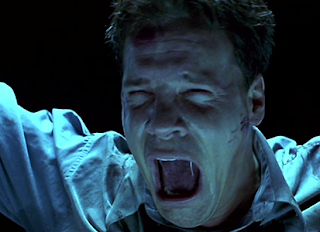Detective Joseph Thorne (Sheffer) is a guy with a good heart, but bad habits. He avoids his family, cheats on his wife with prostitutes, and snorts coke. He comes upon the infamous puzzle box at a gruesome crime scene and when he unwittingly opens it like everyone else in this series does, he opens the door to a nightmarish world of crazy dream sequences and visits from otherworldly monsters, on top of several real-life murders for which he seems to be the prime suspect.
Like I said, Inferno is definitely the strangest of the Hellraiser movies so far, because it doesn't really feel like a part of the franchise's mythos directly. It has feelings of a movie like Seven, or just about any other movie about a grizzled city police detective who gets in too deep in the dark side of life and descends into madness. There are tie-ins to the universe of Hellraiser with the puzzle box, the Cenobites, and Pinhead, who sadly is only in the movie for a very short time close to the end. The tie-ins are loose but not exactly forced, because the movie is really only about Joseph, which is awesome and a great story. Pinhead, and Joseph's hellish experiences with the Cenobites, are used more as metaphors for the movie's underlying theme.
The filmmaking style from director Scott Derrickson, who also co-wrote the movie with Paul Harris Boardman, and who would go on to make kick-ass movies like The Exorcism of Emily Rose and Sinister, is greatly appreciated for a movie like Inferno, because he had the perfect idea for what this movie should look and feel like. There are no big set pieces or action sequences, no amazingly elaborate deaths that Hellraiser has come to be known for - and that's all okay. After a short time, I was able to stop wondering where Pinhead was and just focus on what they were showing me, and enjoying the message they were trying to deliver.
And what they were trying to say with this movie was actually very well thought and poignant. The child's fingers that are found at each crime scene, the strange child's room that Joseph keeps visiting in his dreams, the child's voice calling out to him for help - the audience slowly finds out that that was all Joseph. The final set up where Joseph is confronted with Pinhead (who was disguising himself as a psychiatrist - kinda weird, but I'll go with it) reveals that this is all about him being in his own personal hell, where he is slowly cutting away at his soul, because of his life choices and the people he has hurt. I like that. I especially like how at the end, he actually doesn't get a second chance to change things. It harkens back to Joseph's conversation with his partner Tony earlier in the movie about palindromes - the movie ends the same way it begins, with Joseph still in the hell of the life he has created for himself.
Of course, one could argue with me that all of this sucks because this is not what Pinhead and the Cenobites do in the Hellraiser world. Joseph opened the box, but instead of killing him, they just decide to mess with him? And okay, Pinhead only wants to torture people who want it, but I would say that subconsciously or more likely consciously, Joseph felt that he did need to be punished for what he has done in life and he hates the person he has become. And that is what Pinhead uses to bring him to hell - his own personal hell. Because of this, it's not hard to say that Inferno is a really good movie, and not just a good movie "for a Hellraiser sequel."
I guess I could go on longer and talk about the acting, the effects (which are also really good), the filming style (which completely sells the movie), and those freaky sexy Wire Twin Cenobites and the Half-Chatterer, but the story is really the highlight of Hellraiser: Inferno and is what makes the movie successful to me and one of my favorites of the franchise so far. This is stepping up the game for the rest you Hellraiser sequels, so you better follow through!
Movie Review: Hellraiser [V]: Inferno (2000). There are any Movie Review: Hellraiser [V]: Inferno (2000) in here.
Popular Posts
Search Here
Blog Archive
Featured Post
Hmu Sad Quotes
Hmu Sad Quotes . Performance charts for horizons betapro s p tsx global base metals bull plus etf hmu type etf including. Web i am bent,...




